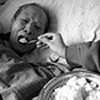By Kay Costley-White
A
lot is written these days about aging gracefully. As we approach our
senior years, we also become aware of a vague dread: we don’t want to
acknowledge our fear of dying.
Evolution, while fitting us
with an urgent will to survive and multiply, also equipped us with a
powerful, instinctive fear of death. It is perfectly normal and natural
to have a strong aversion to anything to do with it. Many people end
their lives without ever addressing the issue. But if we choose to open
up to this part of our genetic makeup, what is it really about? Does it
relate to the course of illness leading to the body’s demise, to the
process of dying itself, or to fear of what comes after? Or is it a
combination of all three, with a host of other unnamed distresses
tagging along?
Most of us dread things we anticipate could
happen during our last days: loss of dignity and control, inability to
communicate, confusion, warehousing in institutions, and having our
dying prolonged by medical technology. We are fearful that our families
will run out of energy to care for us, that we will be left alone, that
we will be short of breath and in pain. We may feel our lives have
become meaningless, that we are a burden. We may believe that the
actual process of dying is painful and distressing. We may fear what
will be done to our body once we are dead. We may worry about how our
families will cope, whether we will meet a vengeful God, if our species
will survive.
How can we deal with all our fears related to dying?
Our
task is not to deny or eradicate them. Resisting our fears will only
cause them to persist. We’re called, instead, to become more familiar
with them, to develop a truce with them, to allow them into the
fullness of our lives. Once we’ve acknowledged our fears, we can then
turn them into expressions of hope. For example, fear of abandonment
can become hope to have our loved ones around us; a dread of physical
pain can become hope for effective symptom relief; a distaste for
hospitals can become hope to spend our last hours in our own bed. The
energy spent in pushing fear away may then be released for high-octane
living.
By embracing our fears and defining our hopes, we will
have taken a step towards wisdom, that ethereal quality we supposedly
espouse as we mature.
What do you think?

